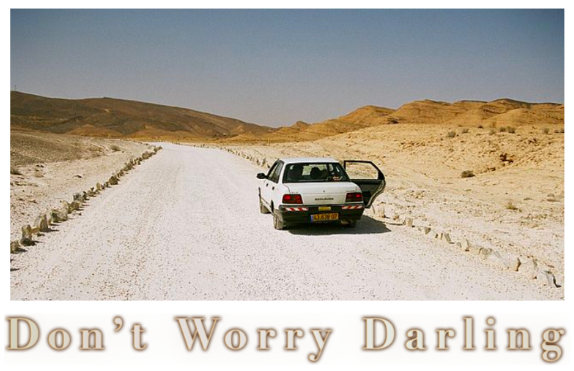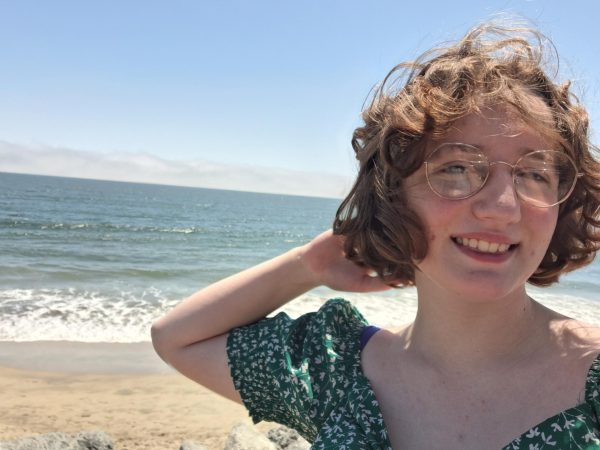“Don’t Worry Darling”: not quite another male victory
A teenage review of the fan favorite with shockingly low critic ratings.

Olivia Wilde’s “Don’t Worry Darling” takes place in Victory, an idealistic desert town.
October 10, 2022
On Sept. 23, “Don’t Worry Darling” was released in movie theaters to the strong anticipation of many. With a vague movie trailer, the only information readily available to intrigue an audience was the recognition of a thriller directed by Olivia Wilde, starring herself, Florence Pugh, Harry Styles, and Chris Pine.
The film follows a group of women in the ‘50s, living what is seen as an ideal life in the perfect desert town of Victory, California. During the day, the women cook, clean, and socialize, while their husbands work on a top-secret job known only as the Victory Project. When Alice Chambers (played by Florence Pugh) begins to have uncanny visions and seemingly hallucinated experiences, the plot is thrown into full swing.
While the beginning of the movie was baffling, it quickly picked up and drew the viewer into the story alongside everyone else in the theater, prompting audible gasps at various points and energetic discourse after the credits. Watching it alongside strangers, none of whom truly knew what the movie held, felt like being a part of something in a way that seeing a new movie for a largely publicized franchise cannot hope to capture.
While its reputation as a psychological thriller is relatively accurate in reference to mystery and confusion, even unexplained scenes had aspects that allowed the viewer some level of understanding. By doing so, one was able to wonder about what everything meant while simultaneously following a less confusing story, effectively counteracting a possible loss of interest due to bewilderment.
Occasional disturbing images and disorienting action scenes kept viewers intrigued, but managed to provide horror prompting curiosity, rather than horror for the sake of adrenaline. This, combined with the clear social commentary and comparisons between past and present misogyny, showing strong female characters in the context of actual power imbalances, made a fascinating story distinguishable from similar sci-fi tropes.
As someone who generally dislikes the actual experience of sitting and watching movies, I was unusually excited to see this film. Unless I have some sort of previous investment in a story or franchise, I usually avoid it purely on the basis of saving time. In the case of “Don’t Worry Darling,” a public relationship between director Olivia Wilde and lead Harry Styles, as well as online speculation about the validity of the relationship and rumors about high tensions between cast members, brought fans from all sides of the internet together to defend and debate specific actors and actions.
This was even further exacerbated by ongoings at the premiere of the movie at the Venice Film Festival, where interactions between Wilde, Styles, and Pugh were picked apart by supporters and skeptics alike.
The online whirlwind of behind-the-scenes drama ultimately led to a giddy feeling of wanting to see the movie as soon as possible, purely for the sake of seeing it play out on screen, with the feeling that I knew something that other people didn’t. This inherently proves the genius behind the marketing leading up to the release of “Don’t Worry Darling,” whether intentionally dramatic or not.
While the plot was captivating, the script, particularly in what was supposed to be high-tension moments, was lacking. This led to strong criticisms of the actors’ performances, with many online stating how Pugh’s performance shined in comparison to Styles’ subpar portrayal of a strongly conflicted character. In my opinion, there were a few instances in which the acting drew the viewer out of the story; however I believe it was due to the actual tacky writing rather than the ability of the cast.
Along similar lines, the ending left some unsatisfied. However, it successfully ended the story that had been the main focus of the movie. While it can be seen as sudden and unfinished, it’s highly possible that the ending was meant only as a set-up for a sequel movie in the future. It wholly completes one aspect of the story and answers the majority of the audience’s questions, leaving the movie at approximately two hours, while inspiring discussions about what happens after the end, creating a perfect opportunity, plot and marketing-wise, for a follow-up film.
While the general reception of this movie was positive, with a 75% audience rating on Rotten Tomatoes, negative reviews abounded in online articles and professional critiques.
“Looks fabulous — the 1950s never shone so brightly — but doesn’t have an original thought to ponder,” male Toronto Star critic Peter Howell said.
Similar critiques have come from various reviews, specifically bashing Styles’ performance and the unoriginality of the plot. Most negative reviews compare the film to similar sci-fi films, but with the illusion of having a message to send. It is important to note that the majority of negative reviews, from varying news websites and magazines, come from male critics debating the supposedly uninfluential message and plot of the movie. While there are absolutely exceptions, top positive reviews come from women.
“While the film isn’t adding anything new to the conversation about gender imbalance in our society,” Baltimore Magazine’s female Editor-in-Chief Max Weiss said, “it’s a conversation we need to keep having again… and again… and again.”
In the context of a movie where the main message revolves around modern male cult behavior and female manipulation, drawing comparisons between the present and the ‘50s, conclusions can be drawn about the validity and value of these moral lessons based purely on the authors of each review.
Ultimately, “Don’t Worry Darling” is a fascinating film with both an entertaining plot and important social commentary. While it’s definitely not a movie for everyone, it’s also in no way a traditional thriller, romance, or sci-fi, making it a unique experience for fans of all kinds.


